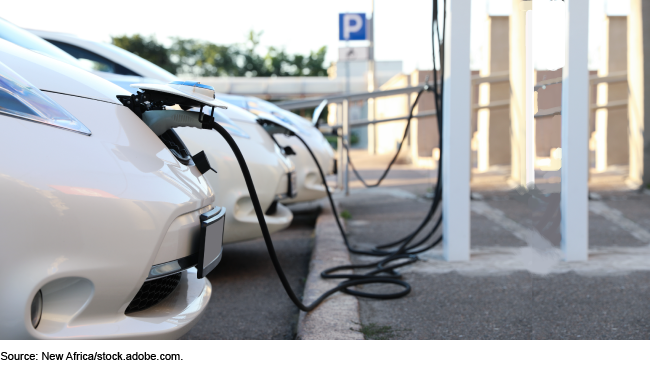Federal Vehicle Fleet: Efforts are Underway to Facilitate the Transition to Zero Emission Vehicles
Fast Facts
Recently, federal agencies have been buying more zero emission vehicles for their fleets.
We examined the costs and benefits of using zero emission vehicles in the federal fleet. The autos and charging stations generally cost more than gas vehicles, but they emit fewer greenhouse gases. As of last year, most agencies were still buying gas vehicles.
Three federal agencies are leading the fleet transition—providing training, forming working groups, and collecting data and feedback to help the government shift to an all zero emission fleet by FY 2035.

Highlights
What GAO Found
The cost of Zero Emission Vehicles (ZEV) is generally higher for federal agencies than the cost of gas vehicles, largely due to higher acquisition and monthly lease payments. However, peer-reviewed studies GAO reviewed found that ZEVs offer environmental benefits and may offer reduced maintenance costs. Agency officials GAO spoke with described gas vehicles as more flexible and convenient.
In fiscal year 2023, 11 selected agencies in GAO's review were acquiring mostly gas vehicles for their fleets. Officials from most selected agencies told GAO they believe that their ability to meet the ZEV acquisition goals established by Executive Order 14057 will depend on factors outside their control, including the availability of ZEVs that match their mission needs. Agencies did not meet their combined self-set targets for fiscal year 2023 to acquire almost 9,500 light-duty ZEVs through the General Services Administration (GSA). Instead, they acquired about 60 percent of this combined target (see fig.).
Agencies' Combined Light-Duty Zero Emission Vehicles (ZEV) Orders Compared with Targets and Gas Vehicle Orders, Fiscal Year 2023

Three federal agencies are considered the main “facilitating agencies” for the ZEV transition—the Council on Environmental Quality, the Department of Energy (Energy) and GSA. GAO found that these three agencies have various collaboration and other efforts to facilitate the ZEV transition. For example, their efforts aimed at helping to foster collaboration and learning among other federal agencies include establishing multiple working groups and hosting an annual training conference. The three agencies also are collecting data and feedback to improve their assistance to federal agencies. For example, Energy updated a ZEV acquisition decision-making tool to allow for multiyear planning based on federal agency user feedback.
Why GAO Did This Study
Executive Order 14057, issued in December 2021, requires that (1) affected agencies' acquisitions of light-duty vehicles (e.g., sedans, smaller sport utility vehicles, and smaller pickup trucks) must be ZEVs by the end of fiscal year 2027 and (2) all vehicle acquisitions must be ZEVs by 2035.
The James M. Inhofe National Defense Authorization Act for Fiscal Year 2023 includes a provision for GAO to review how the costs and benefits of operating and maintaining electric vehicles in the federal fleet compare with those of operating and maintaining gas vehicles. Among other objectives, this report describes (1) how the primary costs and expected benefits of ZEVs compare with gas vehicles in the federal fleet, (2) the types of vehicles that federal agencies acquired and the factors that selected agencies reported would influence whether they can meet the ZEV acquisition goals, and (3) the facilitating agencies' efforts to make progress toward ZEV goals.
GAO reviewed relevant statutes, regulations, and GSA vehicle acquisition data; and interviewed a selection of industry stakeholders and officials at 11 federal agencies. GAO selected a mix of agencies with different fleet characteristics, such as differing fleet sizes and some with law enforcement missions. GAO also reviewed documentation on agencies' efforts to facilitate progress toward ZEV goals and assessed these efforts using selected key performance management and leading interagency collaboration practices.
For more information, contact David Marroni at (202) 512-2834 or marronid@gao.gov.
